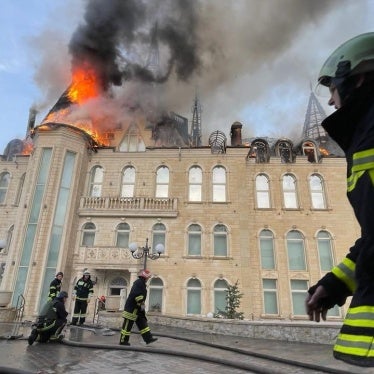(Berlin) – Lithuania’s parliament should reject a government proposal to withdraw from the 2008 treaty banning cluster munitions, Human Rights Watch said today. If approved, Lithuania would be the first country to leave the Convention on Cluster Munitions, which 112 countries have ratified.
“Lithuania’s lawmakers should reject this ill-considered proposal and reaffirm their support for the Convention on Cluster Munitions,” said Mary Wareham, deputy crisis, conflict, and arms director at Human Rights Watch. “Withdrawing from the convention will stain Lithuania’s otherwise excellent reputation on cluster munitions and increase the risk of civilian harm.”
Cluster munitions can be fired from the ground by artillery, rockets, missiles, and mortar projectiles, or dropped by aircraft. They typically open in the air, dispersing multiple submunitions or bomblets over a wide area. Many submunitions fail to explode on initial impact, leaving duds that can indiscriminately injure and kill, like landmines, for years until they are cleared and destroyed.
The Convention on Cluster Munitions is a lifesaving instrument that comprehensively bans cluster munitions and requires the destruction of stockpiles, clearance of cluster munition remnants, and assistance to victims of the weapons. Lithuania actively participated in negotiating the convention and was among the first countries to sign it in Oslo on December 3, 2008, leading by example among countries from the Baltic region. Upon signing, Lithuania pledged its full support for the convention, describing it as “an outstanding example of cooperation” that it hoped would continue.
However, since 2023, Lithuania’s defense minister has advocated for the country to withdraw from the convention, asserting that cluster munitions are a necessary weapon due to changes in its national security situation since Russia’s full-scale invasion of Ukraine in 2022. On July 11, 2024, the Lithuanian government submitted a proposal to parliament recommending that Lithuania withdraw from the Convention on Cluster Munitions.
“Ever-changing national security considerations don’t affect the critical humanitarian reasons that led Lithuania and more than 100 other countries to adopt the cluster munitions ban in the first place,” Wareham said.
In its official transparency reports for the Convention on Cluster Munitions, Lithuania confirmed that it has never produced, stockpiled, transferred, or used cluster munitions. It has actively participated throughout the convention’s meetings and has repeatedly expressed concern at the use of cluster munitions by Russia, Syria, and other countries. The Lithuanian government’s proposal to withdraw from the convention will overshadow this positive track record and reputation, Human Rights Watch said.
Human Rights Watch, the United Nations, and others have reported that repeated Russian cluster munitions attacks have killed and injured hundreds of Ukrainian civilians since Russia’s full-scale invasion in February 2022. Ukrainian forces have also used cluster munitions, resulting in civilian casualties. Since July 2023, the administration of US President Joe Biden has approved five transfers to Ukraine of US cluster munitions delivered by artillery projectiles and ballistic missiles. Russia, Ukraine, and the United States have not joined the Convention on Cluster Munitions.
Cluster munitions predominantly harm civilians. The Cluster Munition Monitor 2023 report found that 95 percent of people reported killed or wounded by cluster munitions in 2022, in which the victim’s status was recorded, were civilians. Among victims whose age group was reported, children accounted for 71 percent of casualties from cluster munition remnants.
The massive humanitarian costs of cluster munitions include civilian casualties at the time of attack and long afterward, as well as the long-term social and economic impact of submunition duds.
At the Eleventh Meeting of States Parties of the Convention on Cluster Munitions in September 2023, member countries including Lithuania condemned “any use of cluster munitions by any actor.” They expressed “grave concern at the significant increase in civilian casualties and the humanitarian impact resulting from the repeated and well documented use of cluster munitions” since 2021, particularly with respect to “the use of cluster munitions in Ukraine.”
The convention has saved countless lives through its humanitarian provisions, Human Rights Watch said. Since the convention’s entry into force on May 30, 2008, member countries have destroyed 1.489 million cluster munitions and 179 million submunitions, 100 percent of the cluster munition stocks once held by the states parties.
Members of the Convention on Cluster Munitions include 24 of the 32 NATO member states and 21 European Union member states. This widespread support demonstrates that most governments, including many of Lithuania’s closest allies, support the ban on cluster munitions.
“Countries that have banned cluster munitions should urge Lithuania to not withdraw from this hugely important convention,” Wareham said. “They have a responsibility to discourage others from using, producing, stockpiling, or transferring cluster munitions because of the foreseeable risk of civilian harm.”
Human Rights Watch is a co-founder of the Cluster Munition Coalition, the global coalition of nongovernmental organizations working to eradicate cluster munitions, and contributes to its Cluster Munition Monitor reporting initiative.









